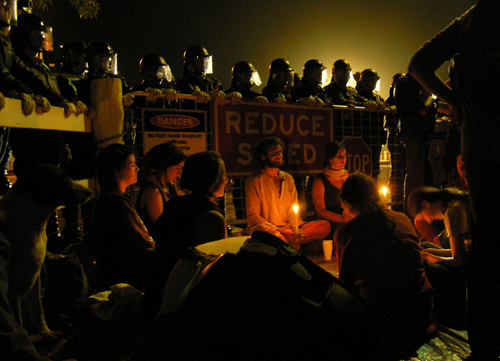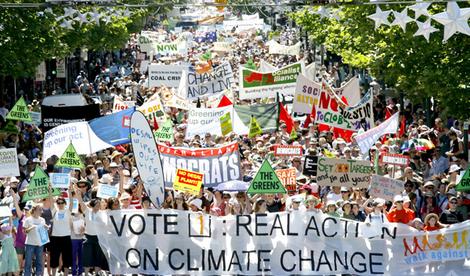This article first appeared in Aurora: the magazine of the Catholic Diocese of Maitland-Newcastle, November 2012 issue.
On December 10, 2005 a small group of four people (including former Maitland Councillor Donna Mulhearn) broke into the Pine Gap joint intelligence facility near Alice Springs. Two were arrested at the fence, the other two were found in prayer on top of one of the small buildings.
In a public statement to the Defence Minister released before their action, the group described themselves as “Christians Against All Terrorism”. They said their action was intended to draw light on the terrorism inherent in bombs dropped in Iraq and Afghansitan as much as in suicide bombers: “in order to be morally consistent, we cannot distinguish between the terrorist acts of a suicide bomber in Baghdad, or of a U.S jet bomber in Fallujah. In both cases innocents are murdered and maimed for a political objective.”
They also claimed their own motivation to act was born from their faithful commitment to the nonviolent Jesus.
Just two weeks ago, a larger group of forty people nonviolently blockaded the gates to the Swan Island military base at Queenscliff, just south of Melbourne, for two days. This group was calling for an end to the involvement of the SAS in Afghansitan, a presence that will continue indefinitely despite public rhetoric of a withdrawal of our troops in 2014. Most og them likewise linked their action to Jesus.
These two groups are part of a small but growing number of ordinary Australians acting as prophetic witnesses against violence and injustice in light of their Christian belief.
Jesus, they claim, was not so much ‘meek and mild’ as the revelation of the radical nonviolent love of God – a love which includes outcasts but also confronts injustice and violence.
The idea of Jesus as ‘nonviolent’ has made a resurgence over the last twenty years, especially in the scholarly world. But it is not news.
In fact belief in the nonviolence of Jesus has been present since the earliest days of the church, who refused to take up arms to defend themselves and instructed converted Roman soldiers they were not allowed to kill.
Perhaps the most famous proponent of the nonviolence of Jesus in word and deed was St Francis of Assisi, who refused to join the Crusades and instead travelled alone to Cairo to seek peace with the Muslim Sultan. St Francis also taught and lived reverence for the whole of Creation as intimately loved by God and thus not for us to destroy.
While Mohandas Gandhi is the most famous practitioner of nonviolence in the modern world, less well known is that he meditated on Jesus’ Sermon on the Mount every day.
In more recent times we see Martin Luther King Jr, Archbishop Desmond Tutu and Nelson Mandela (in his later years), and contemporary priests such as Fr Daniel Berrigan and Fr John Dear all pointing the way to the nonviolence – peaceful of heart while actively resisting evil – that lies at the heart of the Christian faith.
Donna Mulhearn has followed her Catholic faith all the way to Iraq, where she served as a human shield in 2003 and now campaigns to end the use of depleted uranium weapons, which are causing catastrophic birth defects at incredible rates in cities like Fallujah.
These leaders of peacemaking have helped us understand that while Empires achieve ‘peace’ through the sword, Jesus shows us that true peace can only be achieved through sacrificial love directed at justice and the wellbeing of all.
They have also helped us realise that nonviolence is not passive but an active stance that uses creative power for the common good.
Jesus did not just ask us to ‘love each other’, he spelled out in words and actions what this divine love looks like: healing the sick, forgiving each other countless times, sharing our wealth in solidarity with the poor.
And confronting those who would exploit and do violence to others, whether they be political, military or religious leaders. Even those who claim to represent God.
This teaching of Jesus is encapsulated in the Sermon on the Mount, in which Jesus declares ‘blessed are the peacemakers’. The sermon climaxes with the astonishing command to ‘love your enemies’.
The commands of the Sermon on the Mount are so radically upside down to our normal ways of organising ourselves that many in the church have tried to declare them ‘too idealistic’, and not intended for us to really pursue. Some relegated them to ‘ethics of the kingdom of God’, in contrast to more appropriate (and less demanding) ‘ethics of the world’. Others declared these obligations are only for the saints, and not the ordinary Christian.
When you stop to think about it, the idea that Jesus did not intend for us to do what he said is rather odd.
This kind of thinking sometimes gets the church into trouble. In trying to be ‘realistic’, it has found itself blessings wars, making compromises with Nazism, and cozying up to dictators in exchange for a seat at the table of power.
But when the church has tried living out the Sermon, it has moved mountains. The Catholic Church’s role in nonviolently overthrowing the Communist regime in Poland is well known, but remember too its leadership of the 1986 revolution in the Philippines. The Sant’Egidio community helped broker peace in Mozambique in 1992.
Often, ordinary people of faith have led the way. In 1943, a young Austrian Catholic man refused to join the German army. He did so despite the advice of his priest, who told him he must ‘do his duty’. But he said he could not disobey Jesus’ command to love his enemies, and God’s earlier command not to kill another person. He was beheaded for his treason. In 2007, he was beatified by Pope Benedict XVI as a martyr of the faith and a witness to the church.
The call to nonviolent peacemaking is not easy, and certainly not simple. The actions of the two groups of people mentioned at the start of this article are controversial, and many of you will disagree with what they did in breaking the law. It is good for us to have different opinions about what Christian discipleship looks like on the ground.
But nonviolence is the Way of Jesus, the calling of the people of God. Jesus enjoins us to take up our cross and follow him, healing the sick, forgiving each other, praising God for his mercy and love for all of us, not just the powerful.
Like everything else about the journey with Jesus, nonviolence is not something that can be relegated to Sunday mornings.
As Jim Wallis from the Sojourners community in Washington DC says,
“Anyone can love peace, but Jesus didn’t say, “Blessed are the peace-lovers.” He says “peacemakers.” He is referring to a life vocation, not a hobby on the sidelines of life.”
Justin Whelan



